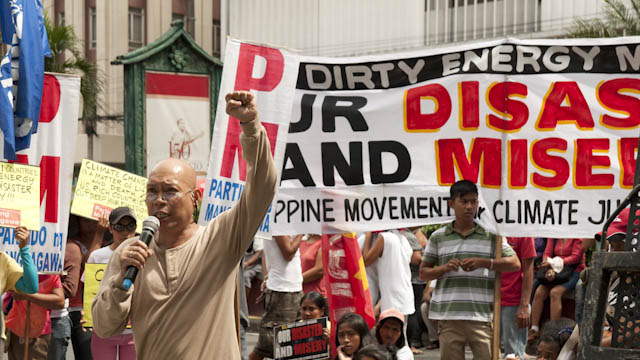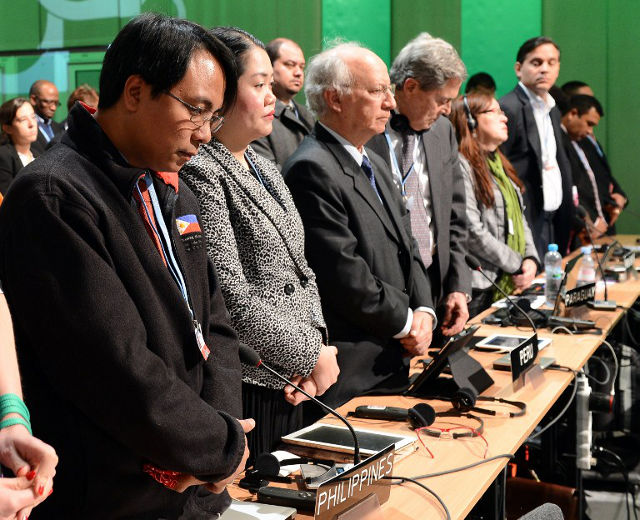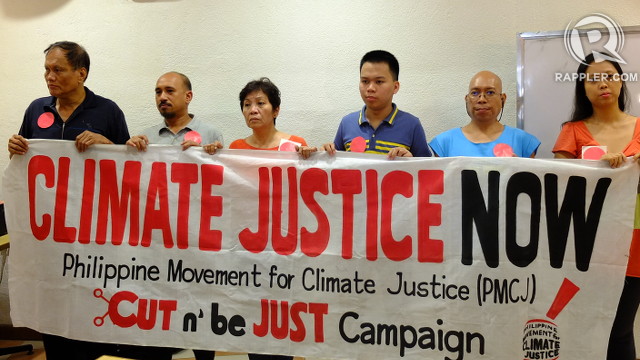SUMMARY
This is AI generated summarization, which may have errors. For context, always refer to the full article.
MANILA, Philippines – One week into the 12-day United Nations climate change conference, environmentalists on Tuesday, November 19, condemned Australia, Japan, and Canada for undermining ambitious deals to drastically reduce carbon emissions.
“This week our colleagues in the Philippines witnessed first-hand the devastation wrought by Super Typhoon Haiyan. There is no doubt that they are experiencing the effects of climate change right now,” said Tasneem Essop, who heads the Worldwide Fund for Nature delegation to the climate change conference in Poland.
“This makes the actions of Japan, Australia, and Canada at these talks all the more difficult to comprehend. There is a fundamental disconnect between the reality of climate change and the attitudes of these countries. They must be held to account to explain their actions.”
The 3 developed countries have signified they will lower their target for reducing carbon emissions. This means they will emit more carbon than the amount they pledged under the UN Framework Convention on Climate Change.
The reduction of carbon emissions is necessary to curb global warming, which scientists say is responsible for more frequent droughts and heatwaves, higher sea level rise and stronger storms. The UN climate change conference in Warsaw, Poland, opened just as the Philippines and the world was beginning to see the extend of devastation brought about by Super Typhoon Yolanda (Haiyan), which has left more than 3,600 dead. (READ: Most powerful 2013 storm hits PH)
Many environmentalists warned that if global temperatures continue to increase, more catastrophic storms are sure to come. Two days after Yolanda, Somalia was battered by a ferocious storm.

Developed countries responsible for the bulk of carbon emissions pledged to reduce their emissions by specific percentages by 2020. This is in order to stay within the UN limit of 2 degrees Celsius compared to the global average temperature before the Industrial Revolution.
But Japan is backing out on its promise.
Hiroshi Minami, its negotiator to the talks, said instead of cutting down emissions by 25% from 1990 levels, Japan will only cut down by 3.8% from 2005 levels. (READ: Japan scales back greenhouse gas emissions target: official)
This is because Japan is now more dependent on carbon-emitting energy sources like coal and other fossil fuels. Ever since the 2011 earthquake and tsunami wrecked the Fukushima nuclear power plant causing leaks of radioactive material, the country has reviewed its nuclear energy policy.
If, before the catastrophe, Japan got 26 to 29% of its energy from nuclear power, today it is not using nuclear energy at all. None of its nuclear powerplants are operational.
Delegates from developing countries were extremely disappointed by Japan’s reneging, said Gerry Arances of the Philippine Movement for Climate Justice (PMCJ) who is in Warsaw for the talks.
More coal
Australia, meanwhile, also signaled it will lower its carbon emission targets. The country has started to repeal a measure that taxes polluters like coal-fired plants and uses the money on clean energy programs. Instead, the money for clean energy programs will be sourced from taxpayer funds, putting the burden on citizens.
Canada, which withdrew from the Kyoto Protocol in 2011, lauded Australia’s decision to end its carbon tax and encouraged others to follow suit.
Australia and Canada follow the United States in being the biggest carbon emitters in the world.
Australia recently approved coal mines in Queensland that will emit 3.7 billion tons of carbon dioxide in 30 years. According to Guardian columnist Graham Readfearn, what these mines will spew out is the equivalent of 6 years worth of greenhouse gases emitted by the entire United Kingdom.

Australia also refused to send ministers to the talks and is being represented only by a climate change ambassador, stoking fears that its government is not serious about climate change policies.
Canada has the world’s 3rd largest oil reserves in Alberta. Known as the Alberta tar sands, it produces oil when its sands are boiled. But this process is energy-intensive and emits lots of carbon. Although the carbon emissions of other Canadian provinces have stabilized since 1990, Alberta’s emissions were up by 41% last year.
Green Climate Fund
One of the most important issues being heatedly debated over in the Warsaw conference is the idea of climate finance.
“Climate finance is the way resources can be provided for vulnerable countries like the Philippines so we can prevent disasters like this, so we are able to plan and implement measures to protect our people from the ravages of climate change. It also allows us to pursue sustainable development,” explained chief negotiator for the Philippines Naderev Saño.
The main mechanism for climate finance is the Green Climate Fund in which developed countries give financial assistance to developing countries for climate resiliency programs. Ideally, this includes technology transfer so that vulnerable countries can take advantage of things like renewable energy or technology that can help them withstand climate-related disasters like storms.
Unfortunately, “this fund is empty for the 4th year in a row,” Saño told Rappler CEO Maria Ressa during a Talk Thursday episode.
“What we want to see here in Warsaw is for countries to put money on the table, to put money where their mouths are. That is the single biggest important issue that we have to settle here in Warsaw.”
Read Saño’s emotional speech calling for the mobilization of the Green Climate Fund here.

In 2009, developed countries like the US, Japan, Germany, Britain, and Norway pledged US$30 billion to fast-track climate finance. Most of it went to renewable energy and climate change mitigation projects. But according to Washington Post, only $5 billion actually went to poor countries to prepare them for the storms, droughts, and heat waves resulting from climate change. (READ: Green groups to DOE: What happened to renewable energy?)
Such projects include the $1 billion Norway gave Brazil to curb deforestation. Japan loaned Egypt $338 million for wind power projects. But critics like Oxfam International have said most of the aid isn’t new. They already existed and were merely “repackaged” for climate change pledge.
The developed countries also promised to increase aid up to $100 billion a year by 2020, but it looks unlikely the promise will be kept. Most of the countries have not announced any plans to shell out anything for 2014.
Painful ironies
One of the most painful ironies of climate change is that countries least responsible for global warming are suffering the most from it.
Typhoon-weary Philippines emits only 0.9 metric tons of carbon per capita while wealthy and powerful US emits 17.6 metric tons. (READ: US owes us climate debt–PH environmentalists)
This irony is why developing countries are pushing another controversial issue in the Warsaw talks: a mechanism that obligates developed countries to compensate poor countries for loss and damage wrought by climate change.
“It’s a platform by which the Philippines and other vulnerable countries can address what we call the 3rd wave of climate change when countries are no longer able to adapt because the losses are just too overwhelming. We need a system to acknowledge these losses,” said Saño.
But according to Philippine delegates to the talk, Australia has signified its refusal to recognize the idea of loss and damage.
Developing countries fear this may set the tone for other rich countries. If this happens, Saño’s ominous pronouncement may come true:
“We are not doing what we can to address the crisis. We will have more of these meetings without making any tangible and ambitious way of once and for all addressing the problem.” – Rappler.com
Add a comment
How does this make you feel?

There are no comments yet. Add your comment to start the conversation.